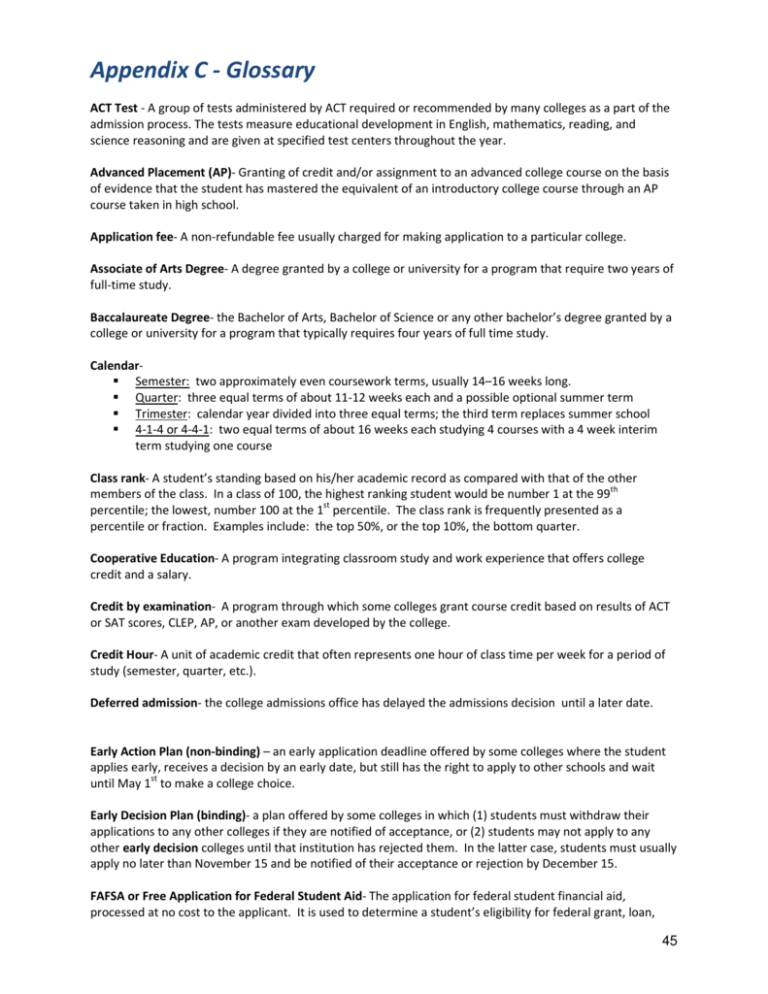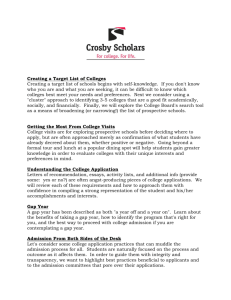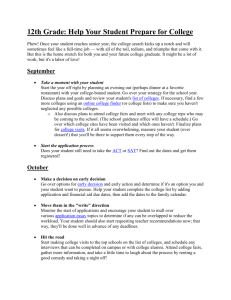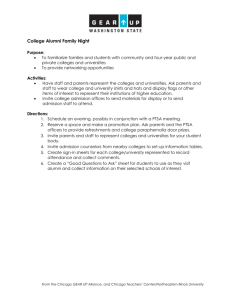Appendix C
advertisement

Appendix C - Glossary ACT Test - A group of tests administered by ACT required or recommended by many colleges as a part of the admission process. The tests measure educational development in English, mathematics, reading, and science reasoning and are given at specified test centers throughout the year. Advanced Placement (AP)- Granting of credit and/or assignment to an advanced college course on the basis of evidence that the student has mastered the equivalent of an introductory college course through an AP course taken in high school. Application fee- A non-refundable fee usually charged for making application to a particular college. Associate of Arts Degree- A degree granted by a college or university for a program that require two years of full-time study. Baccalaureate Degree- the Bachelor of Arts, Bachelor of Science or any other bachelor’s degree granted by a college or university for a program that typically requires four years of full time study. Calendar Semester: two approximately even coursework terms, usually 14–16 weeks long. Quarter: three equal terms of about 11-12 weeks each and a possible optional summer term Trimester: calendar year divided into three equal terms; the third term replaces summer school 4-1-4 or 4-4-1: two equal terms of about 16 weeks each studying 4 courses with a 4 week interim term studying one course Class rank- A student’s standing based on his/her academic record as compared with that of the other members of the class. In a class of 100, the highest ranking student would be number 1 at the 99th percentile; the lowest, number 100 at the 1st percentile. The class rank is frequently presented as a percentile or fraction. Examples include: the top 50%, or the top 10%, the bottom quarter. Cooperative Education- A program integrating classroom study and work experience that offers college credit and a salary. Credit by examination- A program through which some colleges grant course credit based on results of ACT or SAT scores, CLEP, AP, or another exam developed by the college. Credit Hour- A unit of academic credit that often represents one hour of class time per week for a period of study (semester, quarter, etc.). Deferred admission- the college admissions office has delayed the admissions decision until a later date. Early Action Plan (non-binding) – an early application deadline offered by some colleges where the student applies early, receives a decision by an early date, but still has the right to apply to other schools and wait until May 1st to make a college choice. Early Decision Plan (binding)- a plan offered by some colleges in which (1) students must withdraw their applications to any other colleges if they are notified of acceptance, or (2) students may not apply to any other early decision colleges until that institution has rejected them. In the latter case, students must usually apply no later than November 15 and be notified of their acceptance or rejection by December 15. FAFSA or Free Application for Federal Student Aid- The application for federal student financial aid, processed at no cost to the applicant. It is used to determine a student’s eligibility for federal grant, loan, 45 and work-study funds. Some schools may require an additional financial aid form for which there is a processing fee. Federal College Work-Study Program- A government supported financial aid program coordinated through financial aid offices whereby an eligible student (based on need) may work part time while attending class at least halftime, generally in college related jobs. To apply, file a FAFSA. Federal PLUS- A loan program in which parents, graduate students, and self-supporting undergraduate students can borrow from a bank or other lending institutions. To apply, file a FAFSA. Federal Pell Grant- Financial assistance awarded by the federal government on the basis of extreme need and designed to provide the “floor” of an aid package for post-secondary education. The grant may be used toward tuition, room and board, books, or other educational cost, and requires no repayment. To apply, file a FAFSA. Federal Perkins Loan Program- Loans funded by the federal government and awarded by the institution. The loans feature low interest rates and are repayable over an extended period of time. To apply, file a FAFSA. Federal Stafford Loan Program- A loan program in which a student may borrow from a bank or other financial institution. The federal government may pay the interest on the loan while the student is in school. To apply, file a FAFSA. Financial Aid package- A combination of aid (possibly including a scholarship, grant, loan, and work study) determined by a college financial aid office. Grade point average (GPA)- An indicator of the student’s overall scholastic performance, the GPA is computed by totaling the number of grade points earned in each course (generally, A=4, B=3, C=2, D=1, F=0) and then dividing by the total number of courses carried. Grants- Awards that are based on financial need and do not require repayment. Grants are available through the federal government, state agencies, and educational institutions. Honors Program- A plan designed to encourage superior students to engage in a more challenging program than is required. Students who succeed in meeting the requirements of an honors program are usually granted “honor” degrees. Liberal Arts- A broad course of instruction comprising the arts, natural sciences, language, literature, philosophy, religion, and the classics. The Latin origin of the term, arts liberates, literally means “the arts that free” (the mind and spirit). MAP Award – Monetary Award Program provides grants, which do not have to be repaid. Program administered by the State of Illinois. Matriculation- The process whereby a student is accepted, pays the fees, and enrolls in classes, officially becoming a student at the college. This term is only applied to freshman or to a transfer student’s first enrollment. NCCA Initial-Eligibility Certification- In order to participate in intercollegiate sports at NCAA Division I and Division II colleges, student-athletes must be certified through the NCAA. This includes submitting their ACT/SAT scores to the NCAA Initial-Eligibility Center. In order to have test scores sent to the Eligibility Center enter “9999” as one of the college choices at the time of test registration. Open Admissions- The policy of some colleges of admitting virtually all high school graduates regardless of academic qualifications. 46 PSAT/NMSQT – Preliminary Scholastic Aptitude Test. National Merit Scholarship Qualifying Test. Test given in October of junior year to determine eligibility as a semifinalist. Critical thinking, math and writing are assessed. Placement Tests- A battery of tests designed to assess a student’s aptitude and level of achievement in various academic areas so that he or she may be advised to enroll in the appropriate level classes. Private College/University- an educational institution of higher learning that is not supported by public taxes. Private colleges may be independent or religiously affiliated. Public College/University- An educational institution of higher learning that is supported by public taxes. Registration- A process at the beginning of each semester or quarter where the student selects the courses he or she will enroll in, pays the appropriate fees, and sets up a class schedule for the semester or term. Reserve Officers Training Corps (ROTC)- Air Force, Army, and Navy programs that combine military education with baccalaureate degree study, often with financial support for those students who commit themselves to future service in the Armed Forces. Rolling Admission- An admission procedure by which the college considers each application as soon as all required materials have been received. The college then notifies each applicant of acceptance or rejection as soon as possible. Scholarships- Non-repayable awards to students based on merit or talent. SAT Reasoning Test - A test of verbal, mathematical, and writing abilities required or recommended by many colleges as a part of the admission process. SAT Subject Test - A test measuring achievement across one of five subject areas: history, math, science, English and foreign language. There are twenty possible subject tests. Single Choice Early Action: This is a variation on Early Action that currently only a few colleges use. By choosing Single Choice Early Action the student agrees to apply to only one college Early Action. While the student may only apply Early Action to one school, the decision is not binding. Teaching Assistant (TA)- (sometimes called a graduate assistant) a graduate student whose job on campus is to teach, and often to grade, underclassmen. Transcript- The official record of a student’s academic performance from the time of entrance in a given institution to the end of the latest semester. Tuition- The charge for instruction. Generally designated for a year or semester for a full-time student; for part-time students it is often designated by the credit hour of a course. Room and board and books are separate, additional costs. Universal Reply Date (May 1)- Unless a student has requested “early decision”, applicants have up to but no later than May 1 to notify colleges of their intent to attend in the fall. Responses earlier than May 1 are welcome but are equally as binding. On May 2, your spot may be granted to someone on a waiting list if you have not responded. Wait List- Institutions may initially delay offering or denying you admission. When placed on the wait list, the institution extends to you the possibility of admission in the future. Colleges offer admission to wait list candidates if insufficient numbers of regularly admitted candidates accept their offers of admission. 47






